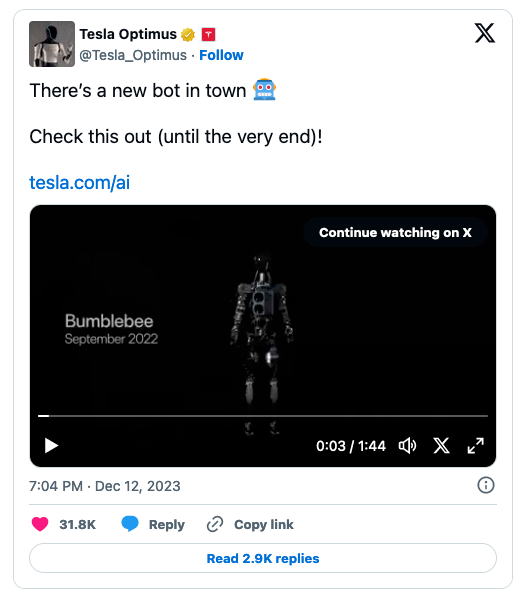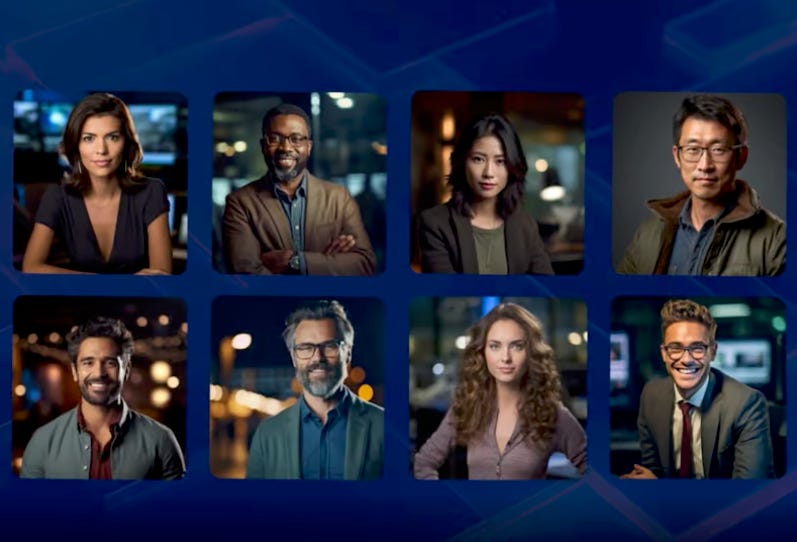002 Weekly TrendDown
2023 December 11 - 17
This week has some insane tech stories.
Telsa’s Optimus Gen 2 Cracks An Egg
Tesla has revealed its second-generation humanoid robot, Optimus Gen 2, boasting enhancements such as a 30 percent increase in walking speed and a weight reduction of 22 pounds compared to its predecessor. Demonstrated in a video shared on CEO Elon Musk's social media platform X, the robot showcases improved flexibility with individual finger and hand movements, as well as the ability to perform tasks like squats and delicately handling eggs using tactile sensors on its dextrous hands.
Musk has emphasized the significance of the project, suggesting that the robot could eventually cost less than $20,000 each and potentially replace human workers in Tesla's factories, though skepticism remains regarding its practical implementation and real-world usefulness. Despite Musk's optimism, questions persist about the extent to which these humanoid robots can effectively supplement human labor in industrial settings.
The EU AI Act Passed
The European Union has officially approved the AI Act, a landmark regulation that will prohibit certain uses of artificial intelligence (AI) and require transparency from providers. The law, which has been hotly debated since its proposal in 2021, will take years to be fully enforced. Prohibited AI systems include social scoring, emotion recognition, and systems designed to influence behavior. While some member states have expressed concerns about the strictness of the regulations, the AI Act has been praised for its transparency and response to public concerns. The US, in contrast, has struggled to implement AI regulations.
Bezos Envisions A Trillion Humans Living on Cylindrical Space Stations
During a recent interview with podcaster Lex Fridman (#405), Amazon founder and Blue Origin CEO Jeff Bezos discussed his vision for humanity to inhabit massive cylindrical space stations, inspired by the concepts of science-fiction writer Gerard K. O’Neill. Bezos envisions a future where a trillion people could live in these habitats.
"I would love to see a trillion humans living in the solar system," he told Fridman. "If we had a trillion humans, we would have, at any given time, 1,000 Mozarts and 1,000 Einsteins."
He emphasized the necessity of giant space stations, arguing that planetary surfaces are insufficient for accommodating such vast populations. This vision diverges from that of his space competitor, SpaceX CEO Elon Musk, who aims to establish cities on other planets like Mars. Bezos foresees Earth becoming a holiday destination, accessible via shuttle trips, while future humans could choose between living in space habitats or on Earth.
Our planet would end up becoming a holiday destination, allowing us to hop on a shuttle to visit it, the "same way that you might go to Yellowstone National Park,"
Despite his optimistic outlook on AI's future, Bezos refrained from criticizing Musk, acknowledging him as a capable leader. With Bezos's involvement in climate initiatives and the accessibility of resources through Amazon's technology, the prospect of space habitats becomes increasingly feasible in a potentially climate-challenged future.
The Pope Champions The Ethical Development Of Algorithms or “Algor-ethics”
Pope Francis, in his message titled "Artificial Intelligence and Peace" for the World Day of Peace, acknowledges the transformative potential of AI while advocating for its responsible and ethical deployment. He highlights the benefits AI offers, including liberation from mundane tasks and more efficient processes, as well as its capacity to foster innovation and economic growth. While urging for international cooperation in regulating AI to mitigate potential risks, the Pope emphasizes the importance of inclusivity and compassion in AI development, aiming to ensure that the technology serves the common good and uplifts the most vulnerable in society.
“In the end, the way we use [AI] to include the least of our brothers and sisters, the vulnerable and those most in need, will be the true measure of our humanity.”
By fostering a dialogue on "algor-ethics," he seeks to promote a positive and inclusive vision of AI's role in building a more just and peaceful world.
Researchers Have Invented A Way To 3D Print Tissue and Bone Using Biocompatible Ink Inside The Body
Researchers from Duke University and Harvard Medical School have developed a groundbreaking method termed "deep-penetrating acoustic volumetric printing" (DVAP), detailed in a paper in Science, allowing 3D printing inside the human body using ultrasound waves directed at an injectable biocompatible ink. This innovation builds upon a photo-sensitive ink previously developed by the team, which hardens under light exposure, but with the limitation of light's penetration depth into tissues. Coauthor Junjie Yao explains that DVAP utilizes the sono-thermal effect, where absorbed soundwaves raise the temperature to solidify the ink, enabling precise printing in deeper tissues, bones, and organs. Coauthor Y. Shrike Zhang notes the ease of ink injection and subsequent solidification with a specially designed ultrasound probe, offering versatility from bone-like scaffolds to flexible heart valves. Tests on goat hearts and chicken bones demonstrate successful tissue sealing and bone defect repair, hinting at future therapeutic applications. Despite the need for further research, Zhang expresses optimism about the technology's potential, emphasizing its promising trajectory towards clinical implementation.
AI News Anchors Are Replacing People
In a revolutionary move, a new global news network slated to launch in 2024 is pioneering AI-generated anchors, marking a shift away from human presenters with Channel 1's photorealistic anchors boasting remarkable abilities and diverse appearances.
These AI anchors possess multilingual proficiency and emulate the formal body language typical of traditional news broadcasts, while also attempting humor.
Keep reading with a 7-day free trial
Subscribe to TrendDown to keep reading this post and get 7 days of free access to the full post archives.








